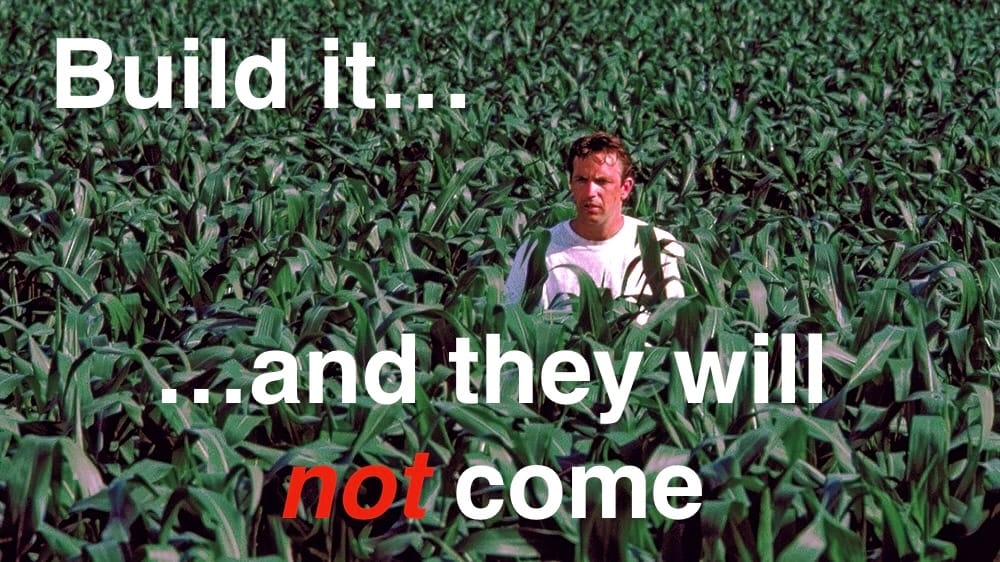Why audience strategy is vital for any publisher
Does SEO matter? Why should we have a social strategy? What's this fuss about newsletters? Inquire within on all these questions…

I was asked, in the closing moments of a course this week, how important SEO actually was to a particular title. That’s a good question, especially coming from someone who had just, along with their colleague, spent a not insignificant amount of money to attend the course. If I couldn’t answer it, it rather invalidates the four weeks of learning they’d just done…
The answer is, of course, “yes, but it depends”, as it so often is. It depends on whether:
- you want to be read
- you want new people to find you
- you have better strategies for finding people to read your journalism
And that last line there is crucial.
Build and they won’t come
For those of you old enough to remember the 1989 Kevin Costner film Field of Dreams, please forgive me for abusing its catch-line:
“On the internet, build it, and they will NOT come.”
There is so much ruthless competition for attention on the internet, unless you have some strategy for getting your work to your potential readers, it will go unread. There’s a near limitless supply of other digital distractions to eat up people’s attention, and unless you’re prepared to fight for your slice of it, you’re doomed.
Here’s an example. Today, for my own pleasure, I wrote two pieces: one on my favourite coffee supplier moving on, and one on a beach picnic we did at the weekend.
I have no real audience engagement strategy for either site right now. And it shows. The pair of them were read, in total, by fewer people than will have opened the newsletter version of this post in the first 10 minutes after it is sent. (In fact, it took less than five minutes ) Certainly, you could get all the readers of those two posts together outside, and not be breaking the current UK COVID-19 gathering rules.
The necessity of an audience strategy
Those of us who still have our roots in print (probably a big overlap with the folks who remember Field of Dreams here…) never really had to worry about our circulations back in the inky paper days, unless we reached the hallowed heights of editor or even — gulp — publisher. We wrote stuff, people edited it, others laid it out, and then it got printed, and distributed and people read it (probably). But that wasn’t our problem. That was the circulation department's responsibility, or the marketing team, or…
That’s not true on the internet. Unless you’re one of the very few titles blessed with an audience engagement team, if you write, edit and publish something, chances are, unless you’re very lucky, basically nobody will read it. You need some mechanism to put that content in front of people, where they are already focusing their attention.
You can optimise it for search, you can give it prominent home page placement, you can optimise it for social, and then share it, you can link it from your newsletter. But if you don’t do something, if you don’t have a strategy for getting your work to your audience, it’s doomed to end up as neglected data on a server somewhere, rarely troubling a human’s eyeballs.
The hell of forgotten content
In my time, I’ve seen national newspaper stories read by 7 people and videos that took two working days to produce that are watched by fewer than a dozen viewers. Think of all the time that is wasted on content that people just don’t actually read.
This is far from a unique problem to journalism. It afflicts the marketing and PR industries, too. Hell, every member of the creator economy has to wrestle with it, as every tiny YouTube channel, low viewer Twitch streamer and paltry subscriber Substack newsletter writer knows. Why are so many of them abandoned? Because building an audience is hard, and all the time you spend doing it is time you aren’t spending creating. It’s demoralising. It can be, in fact, soul-crushing.
So, to return to that initial question, is SEO actually important to a publication? Yes. The true “depends” at work here is the not if SEO is important to your title because it is, but only which stories are worth spending the time optimising, especially if you’re a small team.
The two questions every content creator should ask
To look at it another way, there are two questions you need to answer before you research or commission a piece:
- Who will be interested in this — and why?
- How will they find it?
We’re not always good as an industry at remembering to ask the first question. I’m sure any journalist carries around the mild guilt (mixed with a little pleasure) of knowing that they’ve written a few pieces in their day that weren’t really for the reader at all. They were just written for the journalist’s own self-indulgence.
But we’re terrible at asking the second question. Even in those businesses that have the blessing of an audience team, they’re too often pushed into the “pixie dust” role: trying to sprinkle magic social or SEO dust on top of existing articles.
In online journalism — in online content creation generally — our time defines how much we can produce. How much better would we spend that time, if we invested just a wee bit of it in thinking about why our audience would care, and how they will find it, before we put finger to trackpad? Knowing how our audiences are likely to find a piece before we create it makes it much more likely that it will serve their need.
So, yes, SEO is important. But only because an audience is important. Otherwise, we’re just howling into the digital void.





